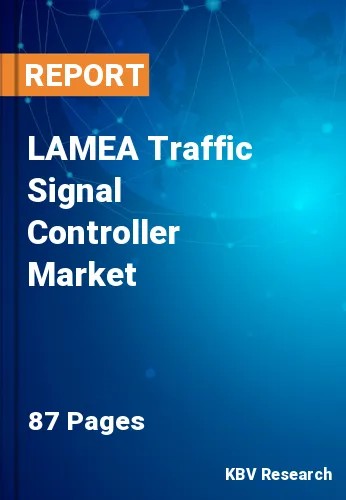The Latin America, Middle East and Africa Traffic Signal Controller Market would witness market growth of 16.8% CAGR during the forecast period (2023-2030).
The emergence of connected and autonomous vehicles has influenced the evolution of traffic controller signals. Advanced controllers are equipped to communicate with connected vehicles, enabling adaptive signal control that considers smart vehicles' real-time movements and preferences, thereby enhancing traffic efficiency. Sensor technologies, including cameras, radar, and LiDAR, are increasingly integrated into traffic controller systems. These sensors provide valuable data for real-time monitoring of traffic conditions, enabling adaptive signal control strategies and facilitating the implementation of intelligent transportation systems.
Additionally, modern traffic controller signals are incorporating green infrastructure initiatives in alignment with sustainability goals. This includes optimizing signal timings to reduce idling times and emissions, promoting eco-friendly modes of transportation, and supporting the creation of pedestrian-friendly urban environments. Modern traffic controller signals embrace dynamic and adaptive control strategies. By continuously monitoring real-time traffic conditions, these systems adjust signal timings dynamically to minimize unnecessary idling at intersections. This optimization reduces fuel consumption and lowers emissions associated with vehicle idling. Integrated with smart traffic management systems, traffic controller signals can analyze traffic flow patterns, predict congestion, and preemptively adjust timings to maintain smooth traffic movement. This proactive approach contributes to reduced idling and the associated environmental impact.
As per the data from the International Trade Administration, in 2020, Saudi Arabia constituted 35% of the vehicles sold in the MENA region and nearly 52% of the vehicles sold in the Gulf Cooperation Council (GCC). In 2019, 556 thousand vehicles were sold in Saudi Arabia; in 2020, 436 thousand vehicles were sold. The projected sales figure by 2025 is 543,000 units, of which electric vehicles (EVs) comprise a mere 32,000. Therefore, rising automotive sales in countries like Saudi Arabia and South Africa will increase the number of vehicles on the road in the LAMEA region. These aspects will boost the demand for in the region.
The Brazil market dominated the LAMEA Traffic Signal Controller Market by Country in 2022 and would continue to be a dominant market till 2030; thereby, achieving a market value of $297.1 Million by 2030. The Argentina market is registering a CAGR of 17.4% during (2023 - 2030). Additionally, The UAE market would showcase a CAGR of 16.5% during (2023 - 2030).
Based on Product Type, the market is segmented into Standard Controller and Smart Controller. Based on Application, the market is segmented into Urban and Suburbs. Based on countries, the market is segmented into Brazil, Argentina, UAE, Saudi Arabia, South Africa, Nigeria, and Rest of LAMEA.
Free Valuable Insights: The Worldwide Traffic Signal Controller Market is Projected to reach USD 13.3 Billion by 2030, at a CAGR of 14.7%
The market research report covers the analysis of key stake holders of the market. Key companies profiled in the report include Siemens AG, Johnson Controls International PLC, Sumitomo Electric Industries, Ltd., SWARCO AG, Zhejiang Dahua Technology Co., Ltd., Traffic Technologies Ltd., Aldridge Traffic Controllers Pty Limited, Indra Sistemas, S.A., Econolite Group, Inc., PPK Technology Sdn. Bhd.
By Product Type
By Application
By Country
Our team of dedicated experts can provide you with attractive expansion opportunities for your business.

